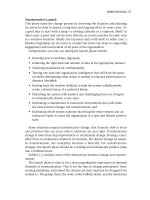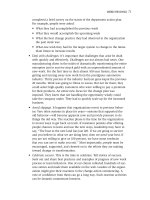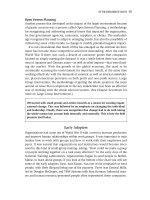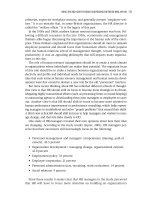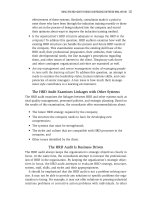Practicing Organization Development (A guide for Consultants) - Part 23 pot
Bạn đang xem bản rút gọn của tài liệu. Xem và tải ngay bản đầy đủ của tài liệu tại đây (238.86 KB, 10 trang )
A FUTURE-RESPONSIVE PERSPECTIVE FOR COMPETENT PRACTICE IN OD 191
Exhibit 7.1. Research on the Future of OD
The current attention and debate over the future of OD is not new. In fact, the subject
has been on OD people’s minds for some time. Articles considering this question, for
example, first appeared in the OD Practitioner in the mid-1970s (Burke, 1973; Miles,
1977; Sperling, 1975), when the field was scarcely twenty years old. Today, the extant
literature discussing the future of OD can be divided into three camps: (1) how prac-
titioners need to be developed to meet the needs of the future; (2) how OD as a
practice will evolve; and (3) what the research agenda for OD will be.
A good deal of the literature on the future of OD has centered on the skills,
knowledge, and competencies required to practice it and how these will evolve. Ini-
tial surveys of OD practitioners by Argyris (1962), Beer (1980), Shepard and Raia
(1981), and Burke (1982) have been followed more recently by those of Sullivan
and McLean (1995), and Worley and Varney (1998). Among the commonalities
across all of the results is a continuous emphasis on the importance of the personal
growth of the consultant (Cheung-Judge, 2001; Quinn, Spreitzer, & Brown, 2000).
Research by Eisen, Steele, and Cherbeneau (1995), which was published in an ear-
lier edition of this book, also used a Delphi format. It identified five categories of
trends and competencies that related to broadened frameworks in a global environ-
ment, clients and client systems, cultural and demographic diversity, values and
ethics, and trends within OD.
The second type of research on the future of OD consists of descriptions of how
OD practice will evolve. One stream of thought argues that current OD practice will
cease to exist as organizations institutionalize the processes associated with OD,
such as team building, survey feedback, conflict management, and sociotechnical
work design (Jamieson & Bennis, 1981). Another stream discusses the variety of
trends facing organizations and projects the needs for OD. A final stream has turned
to discussions of whether there’s a difference between OD and change management
(Farias & Johnson, 2000; Hornstein, 2001; Warren, Ruddle, & Moore, 1999).
Finally, the future of OD has been concerned with issues of OD research. As early
as 1976, Warner Burke was addressing the issue of how the research and practice
agenda of OD needed to change, and he has kept this issue as a central topic in the
OD literature (Burke, 1997, 2002). Pettigrew, Woodman, and Cameron (2001) noted
that research in organization development and change faced six challenges, includ-
ing the complexity of incorporating multiple contexts and levels of analysis, incorpo-
rating time and process, using continuous versus discontinuous change processes,
and attempting to relate change to organization performance. Clearly, there is con-
tinuing research and reflection about the future of OD and its practitioners.
of adversarial confrontation of ideas among participants. In view of these con-
siderations, our design used an anonymous multi-voting process, and we pro-
vided a discussion forum for dialogue among participants as concerns and
disagreements emerged about the items being generated. These measures,
12_962384 ch07.qxd 2/3/05 12:18 AM Page 191
together with the range of demographic characteristics and the intentionally
diverse professional expertise of panel members, made it possible to maintain
a thoughtful diversity of views throughout the Delphi sequence.
We structured this study into four phases, addressing each of the following
sequence of objectives:
1. Scan the emerging and changing environment in which OD is prac-
ticed.
2. Consider consequent challenges and opportunities for organizations
and their managers.
3. Develop possibly new intervention strategies to respond to these chal-
lenges and opportunities.
4. Identify practitioner competencies that will be required by these new
interventions and practices in the coming decade.
As indicated in our opening paragraphs, participants represented a range of
relevant expertise. Of the thirty-nine participants, twelve had experience and
expertise as internal consultants, eighteen as external consultants, twenty-one
as educators in OD, nineteen as managers, and four as futurists. The list of par-
ticipants is shown in Exhibit 7.2.
Over a six-month period, participants logged onto a secure website
2
approx-
imately once a week. They each read the current question posed by the facili-
tator and posted three to six responses. After all participants had a chance to
respond, they were asked to log onto the site again, review a summarized list
of responses, and prioritize them using a multi-voting method. The top 25 to 30
percent of the total items generated was then used as the basis for the next
question, and so on. Our purpose was to develop a broad context within which
to consider implications for OD practice as we moved through succeeding
phases of the Delphi process.
192 PRACTICING ORGANIZATION DEVELOPMENT, 2ND EDITION
Exhibit 7.2. Delphi Panel Participants
John Adams, Juana Anguita, Terry Armstrong, Mila Baker, Patti Barker, Peter Bishop,
Steve Cady, Mary Choi, David Coghlan, Don Cole, Kathleen Dannemiller, Karen Davis,
June Delano, Ray Dyck, Terri Egan, Saul Eisen, Richard Engdahl, Ann Feyerherm, Allan
Foss, Sarah Gevirtz, Glen Hiemstra, Gary Hochman, Mike Horne, David Jamieson,
Prasad Kaipa, Lenny Lind, Oliver Markley, Gary McLean, Steve Milovich, Ann Moreira,
Joyce Reynolds, Carole Robin, Bev Scott, Charlie Seashore, Roland Sullivan, Brock
Travis, Don Warrick, Tony Woodcock, and Chris Worley
12_962384 ch07.qxd 2/3/05 12:18 AM Page 192
DELPHI OUTCOMES: TRENDS, CONSEQUENCES,
STRATEGIES, AND COMPETENCIES
In this section, we tell the story of the Delphi process as it unfolded and sum-
marize the panel’s prioritized responses to the sequence of four questions that
addressed (1) emerging trends and forces; (2) their consequences for organiza-
tions; (3) relevant intervention strategies for responding to those trends and
their consequences; and (4) related practitioner competencies that will be
required to implement these intervention strategies.
Our intention, too, is to involve the reader so that the final competency out-
comes can be understood in the context of the inquiry process as it unfolded.
A second reason for our decision to involve the reader is our belief that an over-
arching meta-competency for effective practice in OD involves practitioners’
ability to modify and evolve our practice continually in response to anticipated
changes in the needs of client systems. Over and above the specific competen-
cies listed as outcomes of Phase 4, we thus propose to engage the reader in a
learning process about doing future-responsive learning itself.
With this purpose in mind, we invite the reader to be an active participant
in the Delphi process. Before reading the prioritized responses to each question,
you might jot down your own responses. These can then be compared with
those of our Delphi panel as reported here. In many cases, we would expect
readers’ responses to be similar to those of our panel. Some readers’ responses
may well be different—perhaps because readers like you may be aware of mate-
rial that was not prioritized by us. Possibly, too, events occurring after the pub-
lication of this book may signal significant new trends, challenges, and
directions for the continually unfolding practice of OD.
Your active participation while reading this chapter can help you to under-
stand these future competency outcomes—and also to learn to maintain a
future-responsive approach in your own practice.
PHASE 1: EMERGING TRENDS AND FORCES
Our world is changing at an accelerating rate and along multiple dimensions.
Emerging trends and forces are changing the context in which organizations
function and the requirements of their leaders for assistance from consultants.
The first phase of this Delphi process provided an environment scan—or per-
haps a future scan—for organizations in this changing world. Participants were
asked, “What are the most significant trends and forces that you believe will
affect organizations during the next decade?” They were asked to consider
trends and forces in the following categories:
A FUTURE-RESPONSIVE PERSPECTIVE FOR COMPETENT PRACTICE IN OD 193
12_962384 ch07.qxd 2/3/05 12:18 AM Page 193
• Business and the economy;
• Science and technology;
• Government and politics;
• Population and demographics;
• Education and training;
• Health and the environment; and
• Culture and belief systems.
Reader response: Before reading the panel’s responses, use a notepad to write
down your own thoughts about significant emerging trends and forces that may
affect organizations and their managers in the next decade or so.
The material generated by Delphi participants is voluminous—even after each
list was prioritized and pared down. Still, even those shorter lists are so long
that it is impractical to reproduce the entire list here, and to do so would be
beyond the scope of this chapter. We have therefore summarized the prioritized
items for the first three phases, and reproduced here only the fourth phase—
future competencies—in full.
3
Summary of Delphi Panel Responses
to Phase 1: Trends and Forces
Accelerated Change, Inequality, and Interdependence
The panel agreed that the perceived pace of change in many aspects of business
will continue to increase and that the pressure for profits will remain intense.
There was also agreement that the trend of increasing gaps between the “haves”
and the “have-nots” will continue. The interdependence of the economies of
the world will increase and create a very fragile system.
Technology and the Knowledge Economy
Science and technology trends included the increasing pervasiveness of the
Internet, the proliferation of wireless technologies, the increasing importance of
biotechnology on agriculture and health industries, and the continued trend
toward a more knowledge-based society. Training will continue to be affected
by technology, making education available any time, anywhere, and using
multiple methods.
Complexity, Diversity, and Linkage Across Domains
There will be increasing partnerships and collaboration between business and
government with complex interdependence across them. The world’s popula-
tion will continue to grow, live longer, become more diverse, and be more
mobile. Cultural differences will become increasingly apparent—and sometimes
194 PRACTICING ORGANIZATION DEVELOPMENT, 2ND EDITION
12_962384 ch07.qxd 2/3/05 12:18 AM Page 194
problematic. Successful managers and executives will become more culturally
aware. Publicly traded corporations will continue to face unrelenting share-
holder demands for profitability. Economic and business downturns will lead
executives to focus even more on the bottom line and shareholder value.
Ecology and Sustainability
Change in the environment is occurring at an increasingly rapid pace. Our sci-
ence and technology are advancing at a pace that prevents us from perceiving
the social or ecological consequences of their use. Concerns about ecological
sustainability, now a common issue in Europe, will move more strongly into
North America.
These were the outcomes of Phase 1, in which emerging trends were identi-
fied. The reader might now compare them to her or his own views about these
questions. What connections do you find? Are there new and important trends
now affecting organizations? This awareness of the unfolding, sometimes tur-
bulent, change in the environment in which organizations function can be a
continual source of guidance and insight into the complexities and priorities to
which our clients must respond and for which we can provide professional
support. It is these conditions and their consequences for organizations that
lead managers to seek assistance from internal or external consultants. Are you
prepared to respond to these needs?
PHASE 2: CHALLENGES AND OPPORTUNITIES
FOR ORGANIZATIONS
After completing the process of identifying significant emerging trends, the Delphi
group was ready to explore what those trends might mean for organizations, man-
agers, and OD practitioners. The question put to the group was as follows: “These
are the top trends we have prioritized. Our task now is to consider possible impli-
cations of these trends—what significant challenges or opportunities will they cre-
ate for organizations and their managers and hence for OD practitioners?”
Reader response: On a notepad, write down your own thoughts about the
challenges and opportunities that may be created by emerging trends—for orga-
nizations and their managers.
Summary of Delphi Panel Responses to Phase 2:
Challenges and Opportunities
Knowledge, Information, and Decision Making Globalization and the accel-
erating pace of technical, environmental, and organizational change combine
to require executives, managers, and staff members to absorb, identify, sort,
A FUTURE-RESPONSIVE PERSPECTIVE FOR COMPETENT PRACTICE IN OD 195
12_962384 ch07.qxd 2/3/05 12:18 AM Page 195
prioritize, and communicate a vast amount of information rapidly. They must
also respond, make decisions, and move quickly.
Human Resources
The pace of change will require creative solutions to hiring, retaining, and devel-
oping core skills and knowledge. Non-core capabilities will be outsourced. The
human and business costs of stress will need to be managed. The boundaries
between traditional HR functions and the processes of OD will become fuzzy
and possibly more conflictual.
Systems Thinking
Ecological trends, globalization, increased partnerships and alliances among a
variety of organizations and governments and other trends all point to the
increased importance of whole-systems thinking to understand, predict, and
manage human affairs. Whole-systems thinking considers the complex interde-
pendence among elements of an organization and also between the organiza-
tion and its relevant or strategic environment.
Organic Organization Design
New organizational forms must be understood. Our knowledge of networks,
alliances, and public/private partnerships must continue to develop. New models
of organization, where competition and collaboration can co-exist, where the orga-
nization behaves more like a living organism that adjusts or evolves with the envi-
ronment, rather than trying to control or modify it, or even worse, treat it as
expendable, need to be developed. Effective, high-commitment work environments
need to be developed so that front-line staff can take immediate action aligned with
business objectives, seeking new partnerships when core competencies required
to pursue new market opportunities exist outside the organization.
Globalization and Cultural Awareness
Globalization, the widening gap between the haves and have-nots, the increase in
alliances and networks, the increased reach of technology to bring people together,
and other trends all point to the need for increased awareness, knowledge,
skill, and intervention processes that address cross-cultural relationships. OD prac-
titioners need to see culture and culture work as central to what OD is about. One
cannot do OD without engaging the culture and subcultures of an organization.
These were the outcomes of Phase 2 in which possible challenges and oppor-
tunities associated with emerging trends were considered. The reader might now
compare them to her or his own views about these questions. What connec-
tions do you find? Are there new and important challenges or opportunities now
affecting organizations? Are you prepared to respond to these needs? The next
phase of the Delphi study explored possible intervention strategies that may be
necessary in the coming years.
196 PRACTICING ORGANIZATION DEVELOPMENT, 2ND EDITION
12_962384 ch07.qxd 2/3/05 12:18 AM Page 196
PHASE 3: EMERGING INTERVENTION STRATEGIES
The third phase of the Delphi process asked participants to consider how the
practice of OD should evolve in response to the trends identified in the first
phase and the challenges or opportunities they would create for organizations
and their managers: “Given the prioritized list we generated in Phase 2, what
new or emerging intervention strategies or approaches will be needed to
respond effectively to those challenges and opportunities?”
Reader response: On a notepad, write down your own thoughts about possi-
ble intervention strategies that may be called for by the organization challenges
and opportunities listed in the previous phase.
Summary of Delphi Panel Responses to Phase 3:
Emerging Intervention Strategies
Working with Whole Systems
More and better techniques for diagnosing and intervening at the whole-systems
level are required. For effective OD interventions to have “stickability” they must
reflect a whole-systems perspective from both a practical, results-oriented focus
and a process-oriented focus. We need strategies for identifying and sustainably
affecting key leverage components.
Methods for Building Collaborative Advantage
The field of OD must develop intervention strategies that support collaborative
decision making among multi-party, multi-organization, and total-system arrange-
ments. OD needs to foster the capability to make collaborative decisions at the
periphery of organizations based on consistency with organizational purpose.
Supporting Virtual Teams
Intervention practices that address the social, technical, and business implica-
tions of virtual teams are required. We need to help client organizations to
evolve from a limiting paradigm of expert individual decision makers to new
methods, assumptions, and technologies of group, networked, and distributed
nodes for making decisions, solving problems, and creating meaning.
Appreciative Approaches
The shift from problem-solving and deficit-based views of interventions to an
appreciative view should continue. Frequently, significant learning and improve-
ment can occur when organization participants build on what they have done
“right” or what is working especially well, rather than only focusing on the solu-
tion to a given obstacle or “problem.” Balancing problem solving with an appre-
ciative inquiry into the healthy and high-functioning aspects of an organization
can help to maintain its creative intelligence and initiative.
A FUTURE-RESPONSIVE PERSPECTIVE FOR COMPETENT PRACTICE IN OD 197
12_962384 ch07.qxd 2/3/05 12:18 AM Page 197
Developing System Leadership
New and more effective leadership development strategies are necessary to
move thinking to new levels. Intervention designs must build capacity to think,
make decisions, and take action systemically, that is, see the big picture, build
in effective feedback loops, and recognize or anticipate and adjust for unin-
tended, delayed, and counterintuitive long-term consequences.
OD and Return on Investment
OD interventions need to be more tied to critical business issues and more able
to demonstrate their operational returns. Practitioners’ view of hard-driving—
and financially driven—top executives as problems must change along with our
view of ourselves. Our interventions need to include and value the priorities of
all organization participants and support holistic, inclusive integration at the
level of core goals of people at all levels of hierarchy, as well as customers,
suppliers, and other stakeholders.
Continuing Education of Practitioners
OD as a field must re-invigorate the training and professional development of OD
practitioners to include more business subjects, facilitation skills, research skills,
and a broad appreciation of the social and behavioral sciences. If sustainability is
becoming an increasingly significant business driver for U.S. companies, it is essen-
tial to restore interdisciplinary perspectives to OD education and practice by adding
economics, public policy, and ecological studies to organization development,
organizational behavior, and industrial/organizational psychology curricula.
Leveraging Diversity and Culture
More sophisticated interventions are needed that appreciate, work with, and
leverage cultural differences. Diversity, conceptual frames, and cultures need to
assume more visible prominence in global business decisions to reduce the ten-
dency to operate from an ethnocentric model. We need more advanced work
on mediating relationships between groups and organizations and on building
more sensitivity and skill in managing diversity and conflict. Because organi-
zation culture needs to be understood as central to what OD is about, our inter-
vention proposals, designs, and strategies must explicitly integrate culture
awareness and culture work as a critical focus.
These are the summarized outcomes of Phase 3 in which emerging inter-
vention strategies were considered. The reader might now compare them to her
or his own views about these questions. What connections do you find? Do your
own thoughts on this diverge in some ways from those of the Delphi panel? And
what competencies will be needed to use these intervention strategies? The next
phase of the Delphi study considered the competencies that OD practitioners
may need in the future.
198 PRACTICING ORGANIZATION DEVELOPMENT, 2ND EDITION
12_962384 ch07.qxd 2/3/05 12:18 AM Page 198
PHASE 4: OD COMPETENCIES FOR THE NEXT DECADE
Our task for this phase was to consider possible implications of the previous
three phases for the continuing professional development of OD practitioners.
We asked, “What new or emerging competencies will be needed to implement
emerging intervention strategies effectively?”
We used the definition of competency that was developed by Bob Tannen-
baum and Roland Sullivan (1992–2005): An OD competency is any personal
quality that contributes to successful consulting performance. The term personal
quality is intended to embrace areas of self, including values and driving
principles; areas of knowledge, including fluency with relevant theories and
models; and areas of skills and abilities, including the requisite behavioral
capacity to perform certain tasks.
Reader response: On your notepad, write down your own thoughts about
important current or new OD competencies that will be required to implement
emerging intervention strategies.
We have reflected on global trends and the challenges and opportunities they
may create for organizations and their managers. We then considered interven-
tion strategies that will be required to respond effectively to these challenges
and opportunities. Based on the outcomes of the first three phases of the Delphi
process, participants generated ninety items about possible emerging compe-
tencies. Using a multi-voting prioritizing process, they concluded that future OD
practitioners will especially need the following thirty-five competencies to imple-
ment emerging intervention strategies and practice effectively during the next
decade. They are listed here in full, arranged in twelve thematic clusters.
Prioritized Delphi Panel Responses to Phase 4:
Emerging Competencies
A. Parallel Interventions in Complex Human Systems
1. Knowledge and skills required to design and lead complex interven-
tions, using multiple parallel techniques that work with individuals,
teams, large-group stakeholder conferences, trans-organizational and
trans-domain events, in fast-cycle sustained coherent change, and
based on action, reflection, and learning at each of these levels.
2. Ability to design and implement individual and organizational inter-
ventions that build capacity to think, make decisions, and take action
systemically, that is, see the big picture; build in effective feedback
loops; and recognize or anticipate and adjust for unintended, delayed,
and counterintuitive long-term consequences.
A FUTURE-RESPONSIVE PERSPECTIVE FOR COMPETENT PRACTICE IN OD 199
12_962384 ch07.qxd 2/3/05 12:18 AM Page 199
3. Knowledge of societies, communities, and social systems dynamics.
The ability to convey the essence of “community” as a motivational
concept. Deep understanding of the concept of “the tragedy of the
commons” and how that is affected by factors such as mental models,
structure, technology, and globalization.
4. Ability to support effective decision making for individuals, groups,
teams, organizations, inter-organizations, and communities. Skills for
rapid time-to-value decision-making models and methods.
5. Strong program/project management methodology skills to manage
complex business change initiatives that require firm attention to
scope, cost, quality, and risk.
B. Global, Trans-Domain and Larger System Work
6. Ability to work ethically and courageously with inter-organization
issues to create wider inclusive boundaries among stakeholders.
7. Skill in bridge-building and alliance management, including developing
trust across a wide range of constituents simultaneously.
8. Awareness and skill related to working with the “larger” system, includ-
ing contracting with the right persons for the right scope of work.
9. Expanded knowledge of systems thinking to include a global perspec-
tive, how to build strategic alliances and use large group methods
when appropriate.
C. Culture Work
10. Deep understanding of culture: how it influences behavior, how it
develops and changes, and the connection between culture and
performance.
11. Understanding of culture as the core deep-structure organizing principle
underlying all aspects of organizations—including hierarchies, reward
systems, competitive strategies, technologies, work-flow structures, and
shared belief systems.
12. Ability to adapt to each unique cultural situation in applying OD
knowledge, skills, and strategies.
13. Ability to join with organization participants in any change process as
an intentional, evolving, collaborative reconstruction of shared ways of
understanding and embodying meaning in their ways of working and
being together.
D. Self-as-Instrument, Continuous Learning, and Innovation
14. Effective continuous learning as needed to respond appropriately to
emerging complex social needs and organizational dilemmas.
200 PRACTICING ORGANIZATION DEVELOPMENT, 2ND EDITION
12_962384 ch07.qxd 2/3/05 12:18 AM Page 200





